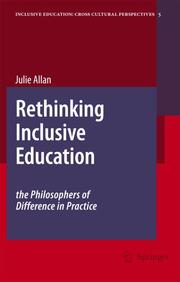-
Zusatztext
-
InhaltsangabeIntroduction Part One: The 'state' of inclusion Chapter 1: The territories of failure Chapter 2: The repetition of exclusion in policy and legislation Chapter 3: Excluding research Part Two: Putting the philosophers to work on inclusion Chapter 4: Deleuze and Guattari's smooth spaces Chapter 5: Derrida and the (im)possibilities of justice Chapter 6: Foucault and the art of transgression Part Three: Rethinking inclusion? Chapter 7: Teachers and students: subverting, subtracting, inventing Chapter 8: Nomadic learning to teach: recognition, rupture and repair Chapter 9: Performing inclusion: instructive arts experiences Chapter 10: Inclusive research? Chapter 11: The politics of inclusion
-
-
Kurztext
-
The inclusion of disabled children and those with difficult behaviour is increasingly being seen as an impossible challenge and, not surprisingly, concerns are being expressed by teachers unions and researchers about teachers' capacities, and willingness, to manage these demands. With Warnock, the so-called 'architect' of inclusion now pronouncing this her 'big mistake' and calling for a return to special schooling, inclusion appears to be under threat as never before. This book takes key ideas of the philosophers of difference - Deleuze, Foucault and Derrida - and puts them to work on inclusion. These ideas allow the task of including children to be reframed and offer, not solutions, but different ways of working which involve altering adult-child relationships -subverting, subtracting, and inventing and restructuring teacher education - recognition, rupture and repair. The propositions also include making use of the arts to challenge exclusion and to establish more inclusive practices. This is a must for teacher educators, researchers, student teachers and practising teachers concerned about the future of inclusion. It offers fresh insights and a steer towards possibilities for a more productive, and political, engagement with inclusion.
-
-
Autorenportrait
- InhaltsangabeIntroduction Part One: The 'state' of inclusion Chapter 1: The territories of failure Chapter 2: The repetition of exclusion in policy and legislation Chapter 3: Excluding research Part Two: Putting the philosophers to work on inclusion Chapter 4: Deleuze and Guattari's smooth spaces Chapter 5: Derrida and the (im)possibilities of justice Chapter 6: Foucault and the art of transgression Part Three: Rethinking inclusion? Chapter 7: Teachers and students: subverting, subtracting, inventing Chapter 8: Nomadic learning to teach: recognition, rupture and repair Chapter 9: Performing inclusion: instructive arts experiences Chapter 10: Inclusive research? Chapter 11: The politics of inclusion
Detailansicht
Rethinking Inclusive Education: The Philosophers of Difference in Practice
Inclusive Education: Cross Cultural Perspectives 5
ISBN/EAN: 9789048175321
Umbreit-Nr.: 1549354
Sprache:
Englisch
Umfang: x, 188 S.
Format in cm:
Einband:
kartoniertes Buch
Erschienen am 25.11.2010
Auflage: 1/2008


